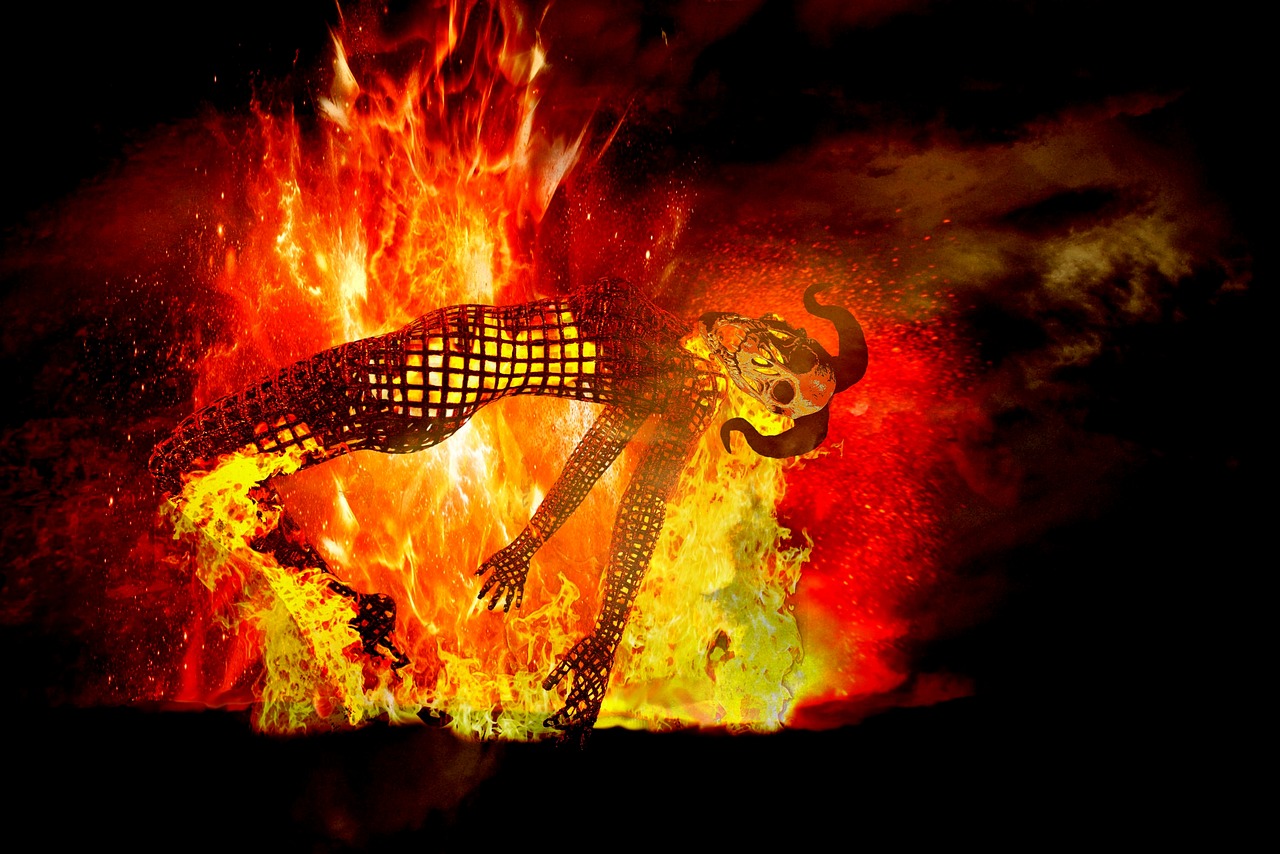 Hi Evan
Hi Evan
I have read your recent articles on annihilationism particularly your review of Edward Fudge’s book The Fire That Consumes. Kudos to you for being willing to take your stance on such a controversial topic as you did with Evolution, at the expense of being called a “heretic” by more traditional Christians.
I am not fully convinced of the annihilationist position as of now as I think the eternal punishment view still has some merits. But having read up on the ANE context of Sheol Hades and Gehenna I no longer see annihilation as a theologically aberrant view.
I have one question though. How much of an influence did your view on estachology lead to you accepting annihilationism? You did bring up the aspect of Revelation being symbolic and how the lake of fire aspect might have a first-century precedent, really appreciated that part.
Brian Godawa another partial preterist has also told me in a conversation he leans towards annihilationism but has not taken a stance yet. You should check his book on Psalms 82 if you haven’t read it yet. He believed the Watchers(fallen members of divine council) were destroyed in the lake of fire in AD 70 permanently ending their rule over the nations. Its sounds unbelievable but he does have his evidence for believing so.
Zhi Han

I have not read Godawa’s Psalm 82 book. I’ve been wanting to, along with his Chronicles Of The Nephilim series. I am a little surprised that he thinks The Watchers were already destroyed in The Lake Of Fire. I was under the impression that he, like me, believed they were imprisoned in Tartarus to await their final judgment. That’s what happened in the last book of The Chronicles Of The Apocalypse novel series. I see the Lake Of Fire judgment as still future.
My eschatology did not really play a role one way or the other. I have listened to 25 episodes of The Rethinking Hell Podcast so far and there are Annihilationists all over the eschatological spectrum. Chris Date is a preterist like Godawa and I, but he’s interviewed several dispensationalists on there as well. For me, the following are the top 5 most powerful factors in leading me to embrace annihilationism, and I talk about them in depth in my upcoming book Yahweh’s Inferno: Why Scripture’s Teaching On Hell Doesn’t Impugn The Goodness Of God.
1: Jesus Said To Fear The One Who Can Destroy Both Body and Soul in Matthew 10:28
The first time I read The Bible for myself many years ago, I started with The New Testament. I read Matthew’s gospel, and as I got to chapter 10, a statement of Jesus’ stuck out as odd to me. In Matthew 10:28, Jesus said “Do not fear those who can destroy the body, instead fear the one who can destroy both body and soul in Hell.” (emphasis mine). I was like “Wait a minute. Destroy both body and soul? That would mean the total annihilation of the person.” Why didn’t I become an annihilationist 10 years ago? Well, the cultural filters I mention in the introduction of Yahweh’s Inferno are why. I basically shrugged my shoulders and went “That’s weird. But Jesus can’t mean that people will be completely destroyed in Hell. After all, Hell is a place of eternal torment.” Instead of letting The Bible speak for itself, I dismissed perhaps the most blatant proof for annihilationism in The Bible because what I was taught from the pulpit about Hell contradicted what I had read from the text.
The context of Matthew 10:28 is Jesus sending out The 12 Disciples to preach the gospel. Verses 2-4 of Matthew 10 tell us the names of all of Jesus’ disciples. Verses 5-14 record Jesus’ instructions to the disciples of what they are to do when he sends them out. “Whatever town or village you enter, search there for some worthy person and stay at their house until you leave. As you enter the home, give it your greeting. If the home is deserving, let your peace rest on it; if it is not, let your peace return to you. If anyone will not welcome you or listen to your words, leave that home or town and shake the dust off your feet.” After this, Jesus warns his disciples in verses 15-27 of what hardships they are to expect when they go off preaching the good news.
“Truly I tell you, it will be more bearable for Sodom and Gomorrah on the day of judgment than for that town. I am sending you out like sheep among wolves. Therefore be as shrewd as snakes and as innocent as doves. Be on your guard; you will be handed over to the local councils and be flogged in the synagogues. On my account you will be brought before governors and kings as witnesses to them and to the Gentiles. But when they arrest you, do not worry about what to say or how to say it. At that time you will be given what to say, for it will not be you speaking, but the Spirit of your Father speaking through you.
Brother will betray brother to death, and a father his child; children will rebel against their parents and have them put to death. You will be hated by everyone because of me, but the one who stands firm to the end will be saved. When you are persecuted in one place, flee to another. Truly I tell you, you will not finish going through the towns of Israel before the Son of Man comes.
The student is not above the teacher, nor a servant above his master. It is enough for students to be like their teachers, and servants like their masters. If the head of the house has been called Beelzebul, how much more the members of his household!
So do not be afraid of them, for there is nothing concealed that will not be disclosed, or hidden that will not be made known. What I tell you in the dark, speak in the daylight; what is whispered in your ear, proclaim from the roofs.”
Then we get to our prooftext. “Do not be afraid of those who kill the body but cannot kill the soul. Rather, be afraid of the One who can destroy both soul and body in hell.” – Matthew 10:28
In context, we can see that Matthew 10:28 comes in the context of Jesus warning his disciples of the persecution they’ll face for being His witnesses. Brother will betray brother to death, a father will betray child to death, they’ll be hated by everyone because of Jesus, and so on. So Jesus basically says “Look, don’t be afraid of your persecutors. They can destroy your body, but your immaterial soul will survive the death of your body, and they won’t be able to destroy that. The destruction of your physical body is the worst they can do to you. However, God can not only destroy your body, but your soul as well. That’s complete annihilation.” This is why in, verses 32-33 Jesus said “Whoever acknowledges me before others, I will also acknowledge before my Father in heaven. But whoever disowns me before others, I will disown before my Father in heaven.” In other words “Since man can only destroy your body, but God can destroy both body and soul, it is, therefore, more sensible to not give into the temptation to deny me before your persecutors just to save your physical life.”
“Do not fear those who can destroy the body, instead of fear the one who can destroy both body and soul in Hell.” – Matthew 10:28
This passage could not be more explicit. Now, the way I got around this verse when I held to the eternal torment view of Hell was to say “Well, Jesus isn’t saying that God will destroy both body and soul, only that He is able to.” However, is this really plausible? Why would Jesus threaten his disciples with the destruction of both body and soul in Hell if God never intended on actually doing that? Jesus might as well have said “Fear the One who can turn you into chickens” or “Fear the one who can cause you to grow an extra head.” or “Fear the one who is able to make all of the food you eat taste like poop.” Since God has no intention on doing these things, it would be odd for Jesus to warn the disciples simply on the basis that God possesses the capability to do them.
2: The New Testament Says That Sodom and Gomorrah’s Judgment Foreshadows The Final Judgment
2 Peter 2:4-6a says “For if God did not spare angels when they sinned, but cast them into hell and committed them to chains of gloomy darkness to be kept until the judgment; if he did not spare the ancient world, but preserved Noah, a herald of righteousness, with seven others, when he brought a flood upon the world of the ungodly; if by turning the cities of Sodom and Gomorrah to ashes he condemned them to extinction, making them an example of what is going to happen to the ungodly;” (emphasis mine)
3: Many Of The Often Cited Proof Texts For Eternal Torment Actually Prove Annihilationism
This is a point that Chris Date unpacks in Episode 7 of The Rethinking Hell Podcast. Many of the biblical passages often cited in support of the traditional view of Hell actually support annihilationism when more closely examined. I’ll give you one of example. Take Mark 9:48. “If your eye causes you to stumble, pluck it out. It is better for you to enter the kingdom of God with one eye than to have two eyes and be thrown into hell, where ‘the worms that eat them do not die, and the fire is not quenched.’” (Mark 9:42-48).
4: The Repeated Use Of Destruction Language
“Whoever sows to please their flesh, from the flesh will reap destruction; whoever sows to please the Spirit, from the Spirit will reap eternal life.” – Galatians 6:8
“For the Lord loves the just and will not forsake his faithful ones. Wrongdoers will be completely destroyed; the offspring of the wicked will perish.” – Psalm 37:28
Matthew 7:13-14 – “Enter by the narrow gate. For the gate is wide and the way is easy that leads to destruction, and those who enter by it are many. For the gate is narrow and the way is hard that leads to life, and those who find it are few.”
“What if God, desiring to show his wrath and to make known his power, has endured with much patience vessels of wrath prepared for destruction“ – Romans 9:22
“Only let your manner of life be worthy of the gospel of Christ, so that whether I come and see you or am absent, I may hear of you that you are standing firm in one spirit, with one mind striving side by side for the faith of the gospel,and not frightened in anything by your opponents. This is a clear sign to them of their destruction, but of your salvation, and that from God.” – Philippians 1:27-28
“For many, of whom I have often told you and now tell you even with tears, walk as enemies of the cross of Christ. Their end is destruction, their god is their belly, and they glory in their shame, with minds set on earthly things. But our citizenship is in heaven, and from it we await a Savior, the Lord Jesus Christ, who will transform our lowly body to be like his glorious body, by the power that enables him even to subject all things to himself.” – Philippians 3:18-21
“The Lord is not slow to fulfill his promise as some count slowness, but is patient toward you, not wishing that any should perish, but that all should reach repentance.“ – 2 Peter 3:9
5: Annihilationism Is Closer To What Jesus Endured On Our Behalf
I have always held to the penal substitutionary view of the atonement and I don’t see myself abandoning this theory of the atonement anytime soon. I don’t know how else to take Isaiah 53:5-6 when it says “But he was pierced for our transgressions; he was crushed for our iniquities; upon him was the chastisement that brought us peace, and with his wounds we are healed. All we like sheep have gone astray; we have turned—every one—to his own way; and the Lord has laid on him the iniquity of us all.” (ESV) or 1 Peter 3:18 which says “For Christ also suffered once for sins, the righteous for the unrighteous, that he might bring us to God,” (ESV)
What did Jesus Christ suffer? A slow, torturous death. He wasn’t just tortured and He didn’t just die, he both suffered and died. If the penal substitutionary view is correct, then we should expect those who aren’t cleansed by the blood of Christ to undergo a violent and painful execution. If the wages of sin were eternal conscious torment instead of death (contra Romans 6:23), then for Jesus to have truly “taken my place”, he should still be suffering to this day. But, fortunately, that is not the case. Traditionalists such as William Lane Craig try to get around this issue by saying that because God is an infinite being and Jesus is God, then Jesus could have suffered the infinite punishment in just a few hours. In Dr. Craig’s own words “that in virtue of the dignity of his person, namely, the second person of the Trinity, what he suffered is equivalent to the eternal suffering of the damned in hell.”2 However, this seems like a theological contrivance to me, and even when I was a firmly convinced traditionalist, this answer never seemed quite satisfactory.
For one thing, if “what he suffered is equivalent to the eternal suffering of the damned in Hell”, then why did Jesus have to go on to die? Once Jesus had suffered enough, God could have just miraculously healed him and had a couple of angels descend from Heaven to get Jesus off the cross. On this hypothesis, Jesus didn’t actually die for sins (contra 1 Corinthians 15:3 and 1 Peter 3:18). His death was superfluous in the atoning process. It was a mere afterthought tacked on at the end of the atoning process. Traditionalists need to tread very carefully here, for this line of thinking gets them on the border of heresy! It’s heretical to say that Jesus’ death did not accomplish our redemption! So, besides being an ad-hoc explanation, it’s theologically perilous.
Conclusion
Any of these 5 points would be a good reason to embrace conditionalism over traditionalism on their own, but when they are all considered together, they make an overwhelming cumulative case. Now, I know that traditionalist readers will likely be like “Well, what about this?” and “What about Matthew 25:46?” and “You never addressed the passages in Revelation?” and so on and so forth. I cannot address everything in a single blog post. I do address all of the objections to conditionalism/annihilationism that I know of in my upcoming book Yahweh’s Inferno: Why Scripture’s Teaching On Hell Doesn’t Impugn The Goodness Of God. I expect to have this book out by early 2020. Perhaps around February or March.
As you can see, my eschatology didn’t play any role at all in changing my view on the doctrine of Hell. It was these 5 lines of arguments and the pitiful responses to them from traditionalists (which I respond to in my upcoming book) that caused me to change my mind.
NOTES
1: In his book “The Fire That Consumes”
2: He brings this up in Question Of The Week #477 “What Did Jesus Suffer?” – https://www.reasonablefaith.org/writings/question-answer/what-did-jesus-suffer/

If you have any questions about Christian theology or apologetics, send Mr. Minton an E-mail at CerebralFaith@Gmail.com. It doesn’t matter whether you’re a Christian or Non-Christian, whether your question is about doubts you’re having or about something you read in The Bible that confused you. Send your question in, whatever it may be, and Mr. Minton will respond in a blog post just like this one.
Share this:
- Share on Facebook (Opens in new window) Facebook
- Share on X (Opens in new window) X
- Print (Opens in new window) Print
- Email a link to a friend (Opens in new window) Email
- Share on Pinterest (Opens in new window) Pinterest
- Share on Reddit (Opens in new window) Reddit
- Share on LinkedIn (Opens in new window) LinkedIn
- Share on Tumblr (Opens in new window) Tumblr
Discover more from Cerebral Faith
Subscribe to get the latest posts sent to your email.





With regard to Point 4 what do you think the “worm” represents?
Well, you have corpses in Isaiah 66:24, so I’d say it’s just part of the death imagery. Corpses being destroyed by fire and eaten by maggots.
–
You wrote \\”With regard to point 2 soneone who holds on to eternal torment can argue the souls of the people of Sodom and Gomorrah could still be suffering in hell even after death.”\\ – I think Joseph Dear gave a pretty good response to this in a blog post on RethinkingHell.com. Joseph Dear wrote
– Joseph Dear, “WHAT THE BIBLE ACTUALLY SAYS ABOUT “ETERNAL FIRE” – PART 2” August 27th, 2018,
Joseph Dear
–
Finally, you should absolutely read Chronicles Of The Apocalypse. It is such an awesome series! Thrilling, captivating, exciting, and educational. To quote Nike “JUST DO IT!” 😀
P.s. i have not read Godawa Chronicles of Appcalypse novels yet.
My source for Godawa’s view is from:
https://godawa.com/psalm-82-part-six-watchers-not-make/ from
With regard to point 2 soneone who holds on to eternal torment can argue the souls of the people of Sodom and Gomorrah could still be suffering in hell even after death
Ok,pretty reasonable explanations. What do you think of this article? It claims the greek word for “destroy” in Matthew 10:28 can refer to people who are spiritually lost but still physically alive or persecuted christians in other contexts,so the verse may not be talking about the physical destruction of the soul
https://carm.org/annihilationism-and-matthew-10-28-destroy-body-and-soul-in-hell
Most of the article is just pointing out that appolumi doesn’t always have to mean literal destruction. And I would agree, there are exceptions to that. However, I’ve done a word study of Appolumi and I have found that actual cessation of existence is the RULE, not the exception. When it refers to something merely lost (like the lost sheep) that’s the exception. 9 out of 10 times it refers to dying, death, destruction, perishing, just something coming to not. I talk about this in detail in my upcoming book “Yahweh’s Inferno”.
–
Moreover, What Slick fails to understand is that Matthew 10:28 is comparing what man CAN’T do to you with what God CAN. “Do not fear those who can destroy the body but fear him who can destroy both body and soul in Hell.” The context makes it pretty clear that Jesus is warning His disciples of persecution. Jesus’ argument is basically that we shouldn’t fear our fellow human beings who would put us to death for our faith. Why? Because after destroying our body, after killing us, we’ll exist as disembodied souls, and no one can touch that part of our being. All a persecutor can do is separate our souls from our body. But God on the other hand can destroy us totally; body AND soul.
–
Context determines a word’s meaning. And the context of Appolumi in Matthew 10:28 doesn’t simply refer to something lost or ruined. When ISIS chops heads off of Christians, they aren’t lost or ruined, they’re physcially destroyed! They’re dead! Now, a traditionalist might point out “But the corpse is still there. They didn’t completely cease to be even physically”. This is another misconception of annihilationism which I talk about in my book. I actually find the term “annihilationism” to be misleading because it makes it sound like, for the view to be true, you need the damned to completely cease to exist. Every last atom needs to poof out of existence. But that’s not the case. All that’s required for the view to be true is that the damned be deprived of conscious existence, which is what happens at SOME level when we die physically. Our bodies no longer have conscious existence because the soul has left. But my view argues that the damned are deprived of conscious existence COMPLETELY at the final judgment. They die “the second death” as Revelation puts it. So, might Hell literally be littered with corpses of the damned? Maybe Isaiah 66:24 is more than just imagery.
–
IMO, I think a better term for the view would be “Exterminationism” or “Capital Punishment Damnation”. But since Annihilationism is the term most people know, it’s the term I stick with, despite its tendency to mislead.
My final question is with regard to your view on Annihilationism is what is your opinion of the state of the unsaved between death and the final judgement? Are they tormented in Hades like the Rich Man in the parable of Lazarus or is there some kind of “soul sleep” like what the Seven Day Adventists claim? With regard to the Lazarus parable,Im aware some have seen it to be figurative and not a literal depiction of the afterlife in hell.
The context makes it clear that the story takes place in “Hades” and this is chronologically prior to the bodily resurrection. This is seen in fact that the Rich Man and Lazarus go where they go immediately after dying, and when The Rich Man pleads with Abraham to send Lazarus to warn his brothers, Abraham said “If they do not have Moses and the prophets. Neither will they believe if someone rises from the dead.” This strongly indicates that Lazarus hadn’t yet been raised. This conversation took place pre-resurrection, before the final judgment. I think Hell is what the resurrected wicked are thrown into after the return of Christ. Hades is the intermediate state. Hitler and Bin Ladin still exist, but they will be condemned to a violent execution on the day of The Lord’s return.
.
Here’s how I view what I call “The Judgment Timeline” for the damned:
.
1: Biological Death.
2: A Conscious Intermediate State for the damned in a place called Hades.
3: Bodily resurrection.
4: Annihilation in the fires of Hell.
.
While The Bible is saturated in the language of destruction, execution, perishing, and being brought to an end, there are also passages that imply a period of conscious torments, such as The Parable OLuke 16 and the mention of “weeping and gnashing of teeth”. The entirety of The Bible precludes ECT but also precludes the JW view that annihilation is immediate.
.
2 Peter 2:4 mentions “For if God did not spare angels when they sinned, but sent them to hell, putting them in chains of darkness to be held for judgment;” We can imagine that these angels are filled with dread (mental torment) as they await their final punishment in the realm known as Tartarus. Perhaps the same is true of humans. It would be analogous to people being held in a jail cell for a time prior to being brought to the judge, being sentenced to death, and then being executed. One traditionalist once said to me “But we don’t torture people in jail”. True, but aren’t death row inmates tormented inwardly knowing that their days are numbered? He was assuming that the torment comes from an external source, but even many modern traditionalists have argued against such an idea.
.
Interestingly, the context of verse 2 Peter 2:4 speaks of judgment as being that of destruction “In their greed, these false teachers will exploit you with deceptive words. The longstanding verdict against them remains in force, and their destruction does not sleep. For if God did not spare the angels when they sinned, but cast them deep into hell, placing them in chains of darkness to be held for judgment; if He did not spare the ancient world when He brought the flood on its ungodly people, but preserved Noah, a preacher of righteousness, among the eight; if He condemned the cities of Sodom and Gomorrah to destruction, reducing them to ashes as an example of what is coming on the ungodly;…” (2 Peter 2:3-6a)
.
What happened to Sodom and Gomorrah is an example of what will happen to the ungodly. And what happened to them? They were thoroughly destroyed by fire from God (Genesis 19:24-25). God didn’t subject them to conscious torture. In Genesis we read that “Early the next morning, Abraham got up and returned to the place where he had stood before the LORD. He looked down toward Sodom and Gomorrah and all the land of the plain, and he saw the smoke rising from the land like smoke from a furnace.” He didn’t see the inhabitants screaming in agony in a fiery inferno. They were destroyed. Only smoke and ashes remained.
.
So, I find no reason to spiritualize or allegorize The Parable Of The Rich Man and Lazarus. It just describes the intermediate state.
In your opinion after the Great White Throne Judgement will only human sinners be destroyed in the Lake of Fire or will the devil and his minions be desroyed too albeit for a longer time? Or are they tormented forever?
Some conditionalists/annihilationists would make an exception for the devil and say that, while humans are destroyed, the devil is tormented for all eternity. On the other hand, other annihilationists like myself don’t see a reason to make the devil and his demons the exception. I believe everything thrown into the lake of fire will be destroyed. For one thing, the text says that what it means to be thrown into the lake of fire is to suffer “the second death”. Well, we know what the first death was. The first death was physical destruction. And while, yes, the soul continued to live on, it remains true that the physical part of them died. It makes sense to interpret the second death as being an actual death, not a ongoing process of dying that never results in death (which, imo, is a bit of an odd thing to say). Moreover, look at some of things in Revelation 20 that are thrown in; it’s not just the devil, but death and hades are thrown in. Death and hades are not the kinds of things that suffer conscious torment for ANY length of time, much less forever and ever. Plus, Paul said in 1 Corinthians 15 that death would be DESTROYED. He also says in Ephesians 6 that the rulers and principalities (which almost every theologian agrees are demonic forces) will be DESTROYED.
–
Finally, whatever your eschatology, everyone agrees that “The Beast” and “The False Prophet”, whatever they are, aren’t individuals, but institutions. The Beast is a symbol, Revelation tells us, for “seven heads and seven mountains” and all that. Institutions cannot suffer eternal conscious torment, but they can be destroyed. I go into this in a lot more precision and detail in my upcoming book, but this is the diet version of my exegetical explanation. So, since we have good textual reasons to think that many of the things thrown in the fire will suffer destruction, most likely everything else thrown in there will be destroyed as well, whether it’s explicit or not.
–
You might be interested in reading this article Joseph Dear wrote for The Rethinking Hell blog. –> http://rethinkinghell.com/2015/12/30/a-primer-on-revelation-2010/
Some personal events in m life have led me to study things in the Bible that seemed to contradict what I’d been taught at church. It started with the realization that the Olivet Discourse was, in fact, describing the destruction of Jerusalem and has led to me questioning whether a lot of what I’ve been taught is actually supported by the Bible. I’m discovering that so-called proof texts can be interpreted very differently than I was taught.
So many topics I’m rethinking — eschatology, eternal torment in Hell, human sexuality, etc. — but I’d come to a dead end as far as finding information on the views I was considering. I’d been praying for about a week for God to lead me where he wants me to go. And then I found this blog last night. I can see that there’s a lot to learn here, so I’ll be digging around to see what I can learn from you. Thank you for leaving this post up!